#the low self esteem and difficulty in regulating emotions
Text
Astrology observations #1

Welcome to my first astrology observations!
I’m in no way a professional astrologer, this is purely for fun. Take only what resonates with you!
I'm happy to discuss these points further in the comments :)
♦️ Leo mars live for the praise. They love words of affirmation, especially in bed 😏 They call the attention effortlessly when exercising, dancing or other mars-related activities. But they might not always like this.
♦️ Chiron 1st house can be very insecure about their appearance if they don’t work to heal this. I know someone with this placement that hates mirrors as they never liked what they saw. But it gives great potential to heal and help others regarding these issues.
♦️ Sagittarius mars people could regularly need new experiences in their sexual life. They might be open to try everything once “just to see”, and they might lean less toward monogamy than other mars placements.
♦️ Moon in the 6th house might be more sensitive to anxiety as their emotions lie in the house of daily life and routine. So they might have to deal with their emotions on a daily basis. They might need regular physical movement and consistent routines to feel regulated and content.
♦️ Pluto conjunct MC might hate posting on social media as they could feel exposed and vulnerable if they do. They might have an intense need to keep their life private.
♦️Mercury conjunct/square/opposite Pluto might swear a lot, or at least more than what they were taught was okay. If their education was very strict they might swear only when surprised, like if they get hurt or forget something.
♦️Venus in 10th house or conjunct MC can work in the fashion or makeup industry and be known for their beauty and sense of aesthetics.
♦️Saturn in Aquarius could have interest or talents in Uranian fields such as astrology or technology. They might be motivated to work towards social causes. They also could have an emotionally distant outlook on life.
♦️Lilith conjunct Ascendant create strong reactions everywhere they go. They are provocative without trying. People can get easily obsessed with them as they exude tremendous sex appeal. But they can also get very aggressive and negative reactions towards them without any reason.
♦️Mars square pluto absolutely need to channel their energy and anger into exercise and breath work. Martial arts is the best for them. If they don't control this energy it can get dangerous for themselves and even for others in extreme cases. But if they learn to control this tremendous force, they can achieve incredible things.
♦️Venus square Saturn can have a lot of difficulties with their self-worth, which affects their relationships. If you have a low self-esteem you will settle for less than you deserve. Once they have sufficiently worked on themselves and on their self esteem, they can find great love. This doesn't mean it can't come early but it might be more challenging. However, Saturn delays but never denies. They are not doomed and will find love (this depends also on other placements and aspects).
♦️Moon in Taurus can have a very calming and healing aura. People feel at peace when with these natives, especially when hugging. They are very grounded and stable, which is felt by others and is very reassuring. However, they can be stubborn at times as Taurus is a fixed sign.
♦️Mars in the 12th house could be passive aggressive sometimes as they do not recognise their own anger and never really learn how to control it. They might have sudden outbursts which can take the people around them by surprise.
♦️Sun opposite Moon can have a difficult relationship with their mother. They can feel that their mother's personality is the complete opposite of them and that they are not understood by her. Other aspects to the moon can come accentuate this or make it easier.
♦️Pisces Mars often have a talent for dancing. One of my best friends has this placement and she is a professional contemporary dancer. Her movements are so graceful, it really looks like water moving. Mars at a pisces degree (12°, 24°) can have a gift for dancing also to a lesser extent.
♦️Pluto in the 9th house can bring transformations and soul evolutions when traveling overseas, studying a higher education or moving abroad.
Thank you for reading ❤️
© lunaa007
#astro community#astro placements#astro observations#astrology#astro posts#birth chart#astro notes#astrology observations#astrology notes#horoscope#leo placements#leo mars#pisces mars#taurus moon#lilith#pluto placements#midheaven#pluto conjunct mc#sun opposite moon#pluto in the 9th#mars in the 12th house#venus square saturn#mars square pluto#moon in the 6th house#lilith conjunct ascendant#aquarius saturn#mercury square pluto#mercury conjunct pluto#mercury opposite pluto#Chiron in the 1st house
2K notes
·
View notes
Text
10 common types of comorbidity! System Edition:
ADHD - Creates attentive/focus/sensory issues, forgetfulness, hopping on many interests, possibly impulsive, have executive dysfunction and RSD (rejection sensitivity dysphoria)
Autism - Sensory issues, finds comfort from structure/routine, hyperfixation (which can contribute to many fictives), have alexithymia, general/personal safe foods and possibly use/appreciate direct responses.
GAD (anxiety) - Restless, tendency to overthink/over-prepare, physical discomfort (stomachache for e.g.), difficulty concentrating, possibly have catastrophic thinking, fatigue and persistent worrying.
PTSD - Experience flashbacks, hypervigilance, easily startled at unexpected sounds/movements, possibly have insomnia, trouble regulating emotions and or nightmares.
OCD - Intrusive/obsessive thoughts, compulsions and obsessions, experience different (depending on alter) intense fears and avoiding them, possibly preoccupied with control/organization/perfection.
BPD - Insecurity, self-doubt, low-esteem, difficulty maintaining relations, volatile mood swings, struggle with trust, possibly impulsive, unstable self image, empty, and fearing abandonment.
NPD - Trouble with empathy, need attention/admiration, sensitive to criticism/rejection, tendency to self grandiose and feel entitled, unstable relations, possibly have self-esteem and regulation issues
ED - Need for control, distorted body image, food avoidance or binging, avoiding social gatherings, trouble with self-worth/shame/guilt, possibly fixated on food, weight, calories.
Depression - Trouble with worthlessness, anhedonia, alexithymia, dissociated and detached, sluggish, possibly have sleep disturbances, feeling isolated, and changes in appetite.
Paranoia - General sense of distrust, overly self-reliant, negative view on people, fear vulnerability, constantly vigilant/wary, possibly easy to angry and hold grudges, trouble maintaining relations.
Let me know what you guys think, are there other symptoms i didn't list them here? If so, please reblog them and share your own, and or experiences along with it too,, i would love to hear them directly!
Remember, comorbids can overlap more than one and, everyone’s symptoms manifests differently too.
- j
#did#actually did#did community#did osdd#did system#dissociative identity disorder#sysblr#plural#system stuff#jeducates
53 notes
·
View notes
Text
The Big Scene (Heavenly Delusion / Tengoku Daimakyo Analysis + Spoilers)
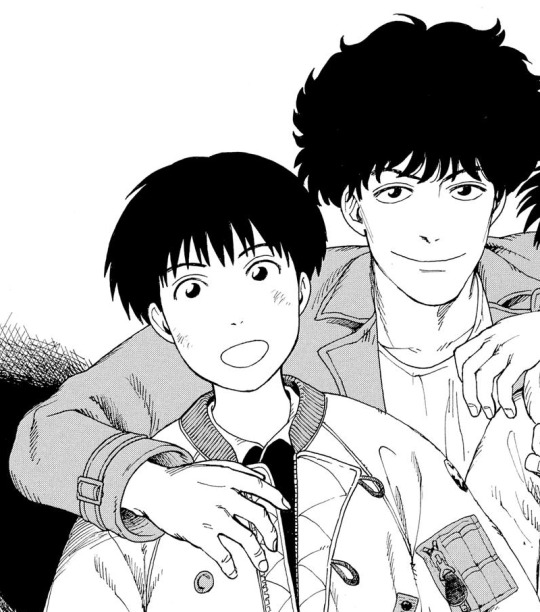
Content Warning: Sexual Assault, Abuse
Full version here:
The 32-34 series of chapters in Tengoku Daimakyo have reached almost parody-creepypasta levels of in spoiler-filled comment sections all across the world wide information superhighway. After painfully poring over the scenes themselves countless times, I decided to do this write-up.
The chapters were initially published on Christmas to great controversy even in Japan, inviting countless readers to criticize and bash the arc. But why would the author publish such risky, risque, explicit scenes "out of nowhere" in a fun sci-fi adventure romp series that definitely has no related themes of sexuality or identity going on elsewhere in the story?
To properly analyze the controversial Robin Inazaki arc, we must understand Kiruko's character first.
Examples of Insecure Attachment Behavior
Frequent bouts of inconsolable crying, difficulty regulating own emotions
Being fearful of abandonment
Being overly clingy with parents/caregivers as a child
Being overly clingy in romantic relationships or friendships as an adult
Masking emotions
Coming across as extremely independent
Low self-esteem
Refusing to ask for help, pushing away others instead of allowing them to get close
Hesitant to become intimate with other people

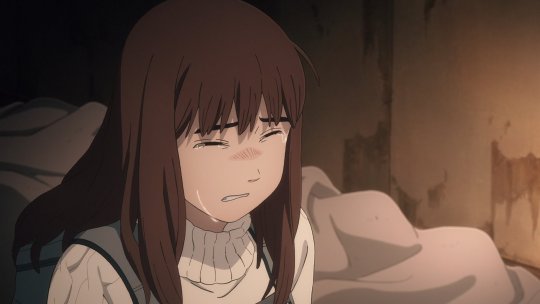
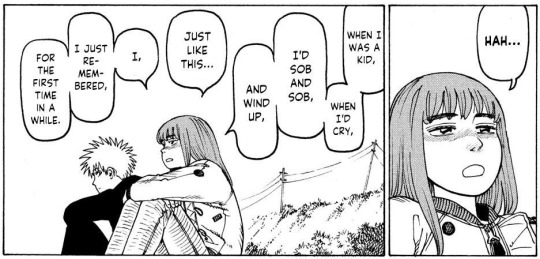
With that out of the way, let's begin.
Hero Complex
Kiruko's entire reason for existing is to be a "Bodyguard" - literally their career for the last 5 years, and what they tried to be when they were Haruki. To be a bodyguard is to be Useful in a transactional, secure way. To Kiruko, being loved is transactional. As an orphan, Haruki was clearly looking for guidance, and seems to have attached himself to Robin psychologically. As a father figure, as a big brother, as a gang leader, as a friend. And he didn't want to start fighting to protect others or his sister, but specifically to impress Robin alone, to get his attention and respect. He idolizes him, and has heavenly delusions about him that will surely be shattered eventually.
As Kiruko, she quotes him routinely over and over in every arc preceding the Robin chapters, imitating how he fights at the arcade, telling Maru all the bits of advice she picked up from him. In a way, she thinks about Robin more than she ever thinks of or even mentions Kiriko. She even copies how he dresses, by asking for his signature jacket. Is this just a simple Aniki Admiration situation? What other older sibling does Haruki have that he has strong feelings for?

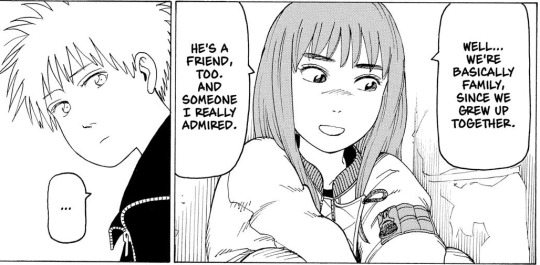
However, things rarely turn out the way she hopes as she tries to be cooly independent - when the situation turns dire, Kiruko desperately screams out for help. This destroys her whole reason for existing, her entire identity. Robin never asks for help. If she can't be like Robin, who can she be? If she has to be protected, why should she even exist? What use is a man who can't fight and protect others? What use is a boy who cries so heavily? Where does this complex even come from? What happened during Haruki, Kiriko, and Robin's time growing up together? We only get a brief flashback of their life together, and not even a single scene with all of them in the same room.
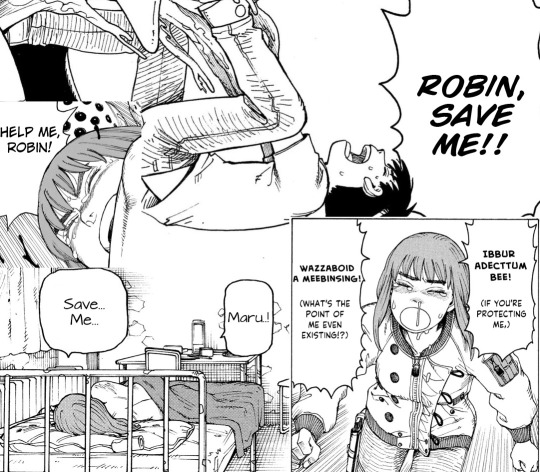
After Maru confesses again after the assault, promising to "Protect her", Kiruko throws his words back and says her existence is worthless if she has to be protected. She's "The Bodyguard", after all. This is similar to her previous "rejection" on the boat - where she simply said "I'm a guy", without actually responding to Maru at all or telling him she doesn't like him. Keeping people at arm's length is her specialty as a bodyguard.
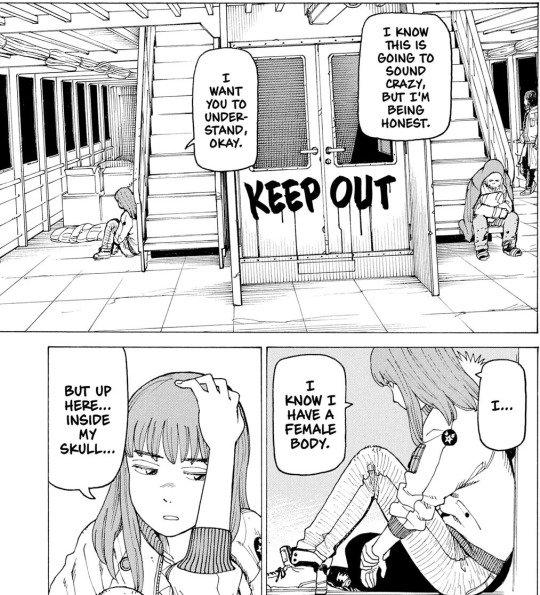
Reminder that her flashback on the boat was not a "canon" objective story as told by the "narrator", but a uniquely subjective story told by a character in-plot for a specific purpose - to scare Maru away from loving her ("KEEP OUT", the non-locked locked door says), and also testing his dedication and resolve as insecure people always do (she does the same when asking Maru about Mikura). The fact that she forgot she used to cry heavily as a child should tell the audience that she's likely forgetting other details about her childhood as well, and what we know of what Haruki was "really like" until we meet an objective third party from back when he was a kid. For all intensive porpoises, Kiruko barely seems to even know herself. She insists she only "looked up to Robin" and didn't like him romantically to Maru, however...
The Kiss That Wasn't
The real controversial point here is that Kiruko not only viewed Robin as a masculine idol figure to try and imitate and get the respect of, but also as a romantic figure. It's unknown where these romantic feelings started - were they always there even as Haruki but got confused by gender, or did they only start becoming as such after becoming Kiruko influenced by Kiriko's residual feelings for Robin - but nevertheless, they're there and very apparent. If she loved one older sibling, it's not too much of a stretch to love the other. If Haruki was originally a girl all along, many readers would suspect she was a "bro-con" in a similar way with how she talks about him and reacts.

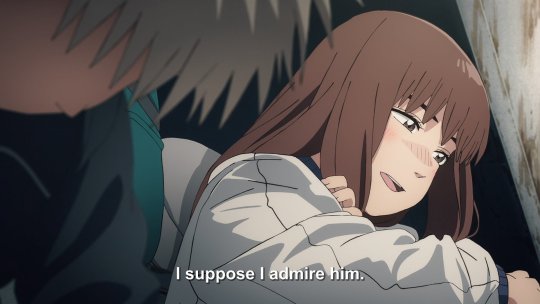

In a pivotal page in 32, Robin whispers seductively into Kiruko's ear, calling her "Haruki" repeatedly, holding her shoulder softly, instantly switching up his aggressive behavior from before. We then get a rare, once-in-a-series possible shot of Haruki's inner consciousness, still as male Haruki, crying with a look of what looks like relief or happiness. She seems to be lost in though, muttering Robin's name, then turns to him expecting to be kissed and embraced (as matched with the previous Tarao/Tokio attempted and rejected kiss), but he turns away and says "No" as he's covered in menacing shadow, beyond her reach. Love rejected.
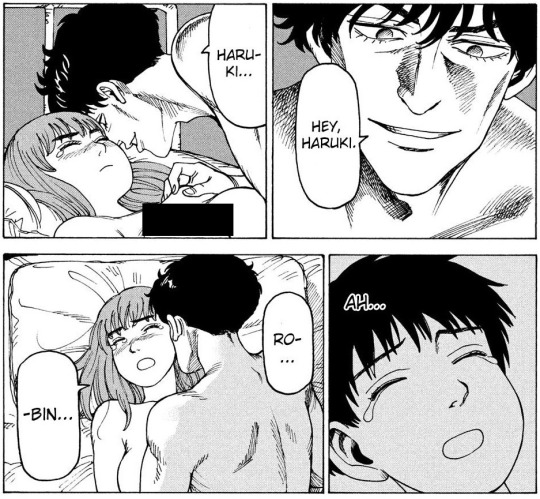
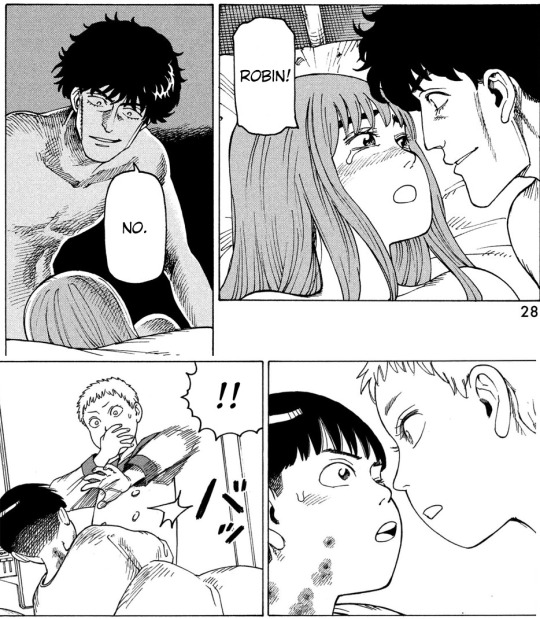
Not only is Kirukos behavior here telling, but Robin's is too. He was deliberately baiting Kiruko/Haruki into reacting like this in order to emotionally reject and hurt her, as if he knew she would try to turn towards him expecting a kiss, almost as if he's done something like this before.
Perhaps this is some of Kiriko, a likely former lover of Robin, coming out and taking over Kiruko's identity already and transforming her former platonic admiration feelings into some kind of confused romantic ones instead. Or maybe there's a hidden part of Haruki's past she doesn't remember, where he was sexually abused in similar ways. Regardless, this is the moment Kiruko's spirit truly breaks. Robin forces her again to look in the mirror and dissociate as he says he has "something to take care of" with Kiriko.
A full rejection of her mind and body as Kiruko. Even her new name isn't acknowledged, even though it's the name the receptionists told Robin to set up the meeting, so he knows about it. Robin doesn't want Haruki, or Kiruko - he just wants Kiriko's body.
Escape
Although Kiruko was first bound by metal handcuffs, at some undetermined time over the 2-3 days of the assault, they were replaced with easily removed ropes instead, which she pulls apart the instant she sees Maru arrive. So, why didn't she attempt to escape prior?
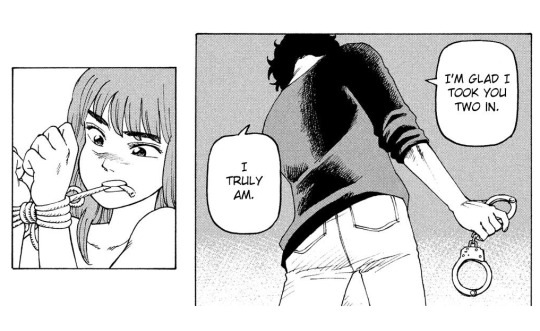
From the author Ishiguro's own words,
"As for chapter 33 of Tengoku Daimakyou, I wrote the story wanting readers to think 'Why didn’t Kiruko run when able to?', so I would be happy if readers try think about Kiruko’s feelings."
-Masakazu Ishiguro
One might postulate about various practical concerns for why she might not have escaped - there are armed guards, she's not physically capable, etc., but the author points out that it's primarily about her feelings.
Wanting to just simply obey can at least make Kiruko feel useful to the man she once respected and loved. An abused child may resort to being treated more like a pet, an object, or even an experiment, if they think they can at least get some form of love out of it from their otherwise cold and uncaring parents.
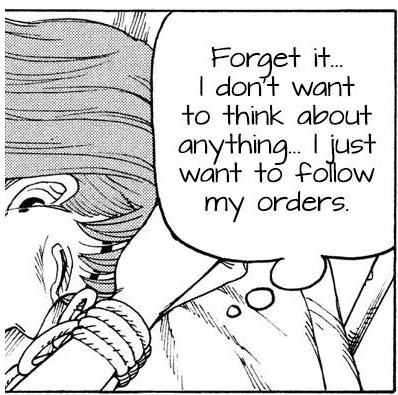
Mercy
Probably the biggest source of criticism over the scene comes from Kiruko begging Maru to not kill Robin as he brutally beats him into the concrete. If a villain does something so evil as raping our hero, something worse than even genocide (The Rumbling...), they should be punished accordingly by being murdered. That's why fictional stories exist! To impart proper moral lessons about crime and punishment when it rarely ever happens in the real world!
Most of these complaints are given by childish readers who want a simple "Rape Revenge" story, where sexual assault only happens to give a masculine hero figure just-cause to freely murder someone in a thrilling fulfilling action scenario, usually rescuing a damsel princess. While a very good series and scene, the Eclipse rape of Casca in Berserk is an infamous example all such seinen scenes inevitably get compared to. Griffith starts assaulting Casca as Guts is pinned down and forced to watch, as he screams out Griffith's name in a bloodthirsty roar.
So, what was Casca feelings during this scene? What was her perspective? She doesn't really matter here, does she, any more than a prop for a revenge story - even if the message may ultimately be that Revenge Is Wrong. Some readers even resent her for possibly "enjoying" it, betraying the reader's - Guts' - own romantic feelings for Casca, the androgynous tomboy.
Tengoku, however, places the "POV" squarely in the mind and eyes of the victim themselves, even seeing inside her consciousness. To force readers into the perspective and body of the "Female MC", even as an androgynous tomboy, they feel a sense of betrayal from the author. They start immediately trying to identify with Maru instead, as he aimlessly wanders outside for days wondering what to do. They want to Beat Up The Villain and Kill Him. But Kiruko says No.
How many abused children or partners of abusive loved ones are able to simply kill their abusers? How many lifetimes does it take for most abuse victims to even admit they were abused in the first place? Even if they hate their abuser with a burning rage, they also feel guilt for hating someone they're "supposed to love", ashamed that they could be "such a bad child/partner", and so on. The emotional manipulation of familial abuse is what sets it apart from strangers abuse.
The Robin Inazaki arc is sandwiched inbetween the Juiichi and Helm revenge stories for a reason. Both side characters get their revenge by murdering their abusers / betrayers in the end, in some glorious fulfillment of a revenge fantasy over people they had no real emotional connection with. But like the rest of the series has shown, from even the Innlady battery scene, Kiruko and Maru are more moral than most, and more sentimental than many (Kiruko cries almost every chapter). Kiruko cannot bring herself to want to murder her abuser or bring her companion to murder him either. This is only natural. Maru having an untapped lust for fighting and being ferociously strong (Arcade fight, Walled City street fight, Michika fight) might come into play as a potential hazard for their relationship later.
Mirrors
Potentially the most shocking and disturbing part of the assault is Robin's deliberate and pointed attempt to psychologically torture Kiruko, as opposed to using physical violence. Robin turns her to a mirror, and in a dazed shock, she can't see herself - she can only see "Sis".
It's the type of scene you don't see in many published manga - or published fiction in general. Probably only in something like Oshimi Shuzo's works, or niche erotica. The gender bending twist as well as the "cheating" angle adds a lot of controversial bait to the mix, as Kiruko dissociates into the mirror as Haruki again, to "watch Kiriko's body" from the reflection. This is a targeted attack on her Hero Complex to protect others but being too weak to do so, and likely also Robin bragging about how he slept with Kiriko while Haruki was in the same room back when they were growing up. It's also targeted sexual emasculation, with clear power plays of an adult masculine muscled male showboating how much more powerful he is over the weaker younger "male".

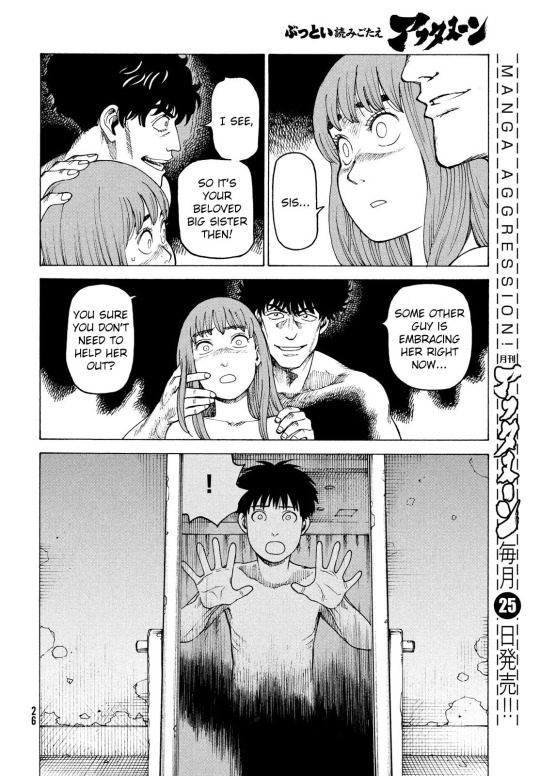
This isn't of course the first time we see Kiruko with mirrors in a sexual manner - one of her introductory scenes in Volume 1 is all about sexually admiring herself - or Kiriko's self - in the mirror, setting the tone for an undercurrent theme of intimate sexuality, identity, and self-reflection in the midst of a strange sci-fi mystery story. Even in the hospital after the surgery, she discovered her new reality by looking into a mirror. Someone who can't trust or be intimate with others will have to find some outlet for intimacy, even if it's staring at a mirror at themselves and their own past life memories (sister), not to other people or the future (Maru).
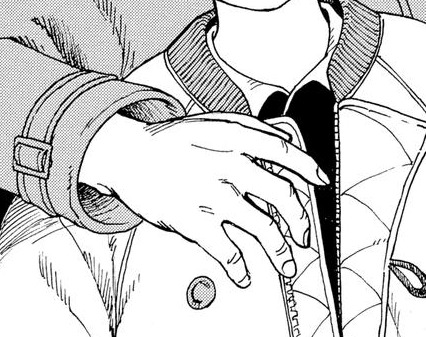
She stops referring to herself as Haruki after the assault as well, tearing up her old photo of her old boy self with Robin -0 the two concepts are inextricably linked. There is no "Haruki" without "Robin" in Kiruko's mind. Note also where Robin's hand is held in an usual way in their iconic photograph together, hovering over Haruki's chest where Kiruko's future breasts will be. Haruki's identity was tied together with some kind of deeper sexually-tinged abusive complex relating to Robin, and she's making roads to try and separate from him - but not completely, just yet. She's still wearing his jacket, after all.
But instead of just looking at the surface level of the glass, who is Kiruko actually "mirroring"? Why did she start wearing Robin's jacket and obsessing so much to impress him? How much of her psychological complexes is about trying to mask and imitate others to compensate for what she feels are her own extreme inadequacies? Self-reflection is a one way street, and other people need to interfere every so often to interrupt the feedback loop.
To sum up, Kiruko uses mirrors three pivotal times in the series so far:
After waking up in the hospital, saying "Sis…"
In the innhouse, where she tries to kiss her reflection
When Robin forces her to look in one, and she only sees "Sis…"
Will Kiruko someday be able to look into a mirror, and not be able to see her sister anymore, but finally recognize her own reflection as Kiruko herself? Will it be tragic for her, joyful, or bittersweet? Only time will tell.
Kiriko
Following the assault, Kiruko gets lost in thought and suddenly recollects some of what she assumes is Kiriko's residual memories "from her body". The image she sees is of Haruki sleeping, with the text "Haruki always sleeps really well, so..." leaving most fans to assume Kiriko and Robin were having sex in the same room while Haruki was sleeping. In episode 3, an anime-only scene was dropped of two people holding hands on a bed - suggesting something similar. Robin's taunting using the mirror suitably fits this angle as well.
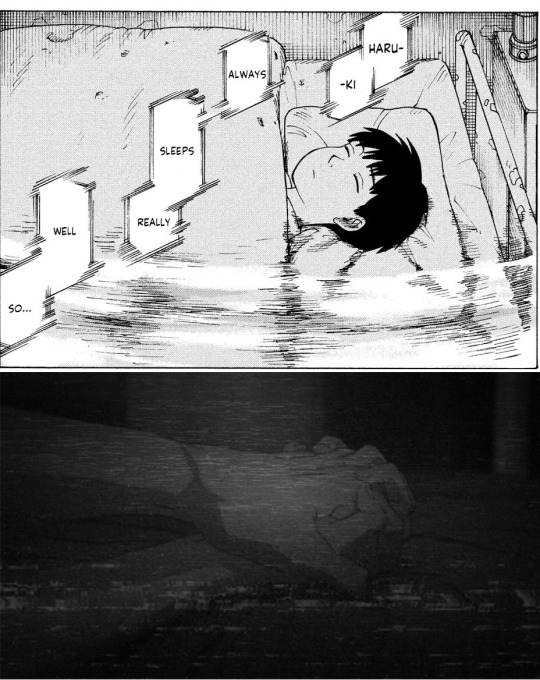
She seems to consider, and LOVE the idea, that she might actually be becoming Kiriko, as if her sister's memories will eventually overtake Haruki/Kiruko's own identity itself. As she mostly loses Robin as a figure to imitate, she switches to another older sibling figure to mirror - Kiriko herself. It would essentially become a way for her to bring her sister back from the dead, by becoming her idolized big sister entirely. Perhaps this is what Robin's so-called psychological "experiment" was for? Will Kiruko eventually sacrifice "herself" for the sake of bringing her sister back, considering her own extreme low self-worth? What will Maru think about that? Is Kiruko trying to embody her former big sister and be with Maru, to live out Haruki's former fantasy of being with his older sister in a role-reversal?
Another question: Did Haruki subconsciously know of Robin and Kiriko's relationship, and thus attempt to try to become either like Robin to be in his place with Kiriko, or to become Kiriko so she can be in her place together in a relationship with Robin?
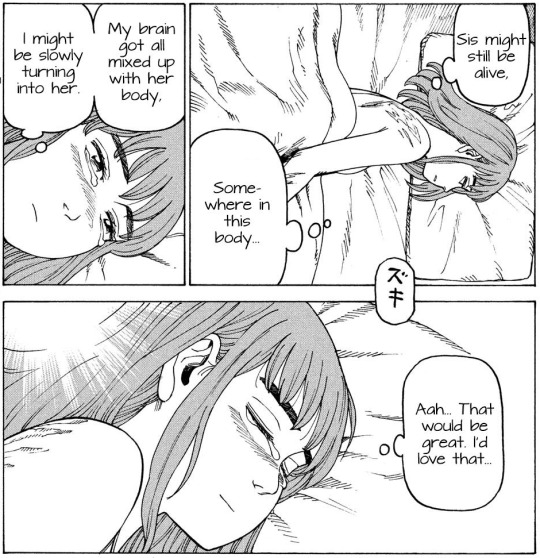
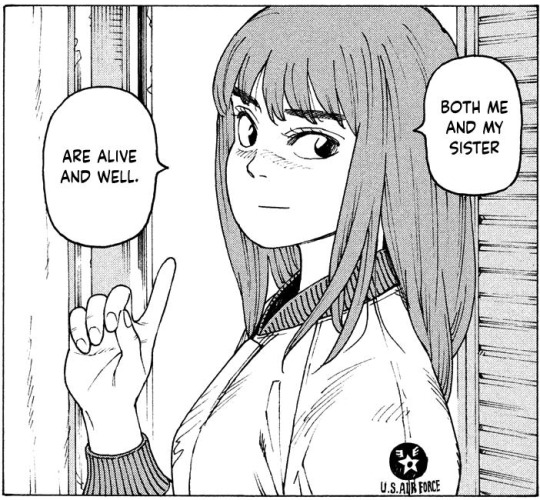
Maru
After the assault, her image of Maru becomes slightly distorted, almost idolizing him as some pure angelic figure - just like it was with Robin, and possibly even concerning Kiriko - and hating herself all the more. She also tries passing him off to Helm "for his own good", failing miserably. He's simply too dedicated to her. As he said on the riverside, Maru loves Kiruko completely and unconditionally - not as Haruki, or Kiriko, but her unique new self, whoever that is.
Kiruko can't understand unconditional love, however. She always has to provide a service, or be useful, or have a "mission", to justify being with someone, even Maru ("Finding Heaven" "Being a Bodyguard"). If her abilities are threatened (loses her gun, etc), what will happen to her? So while she rejects Maru's proposal to protect her, she still grows closer and closer to him regardless.
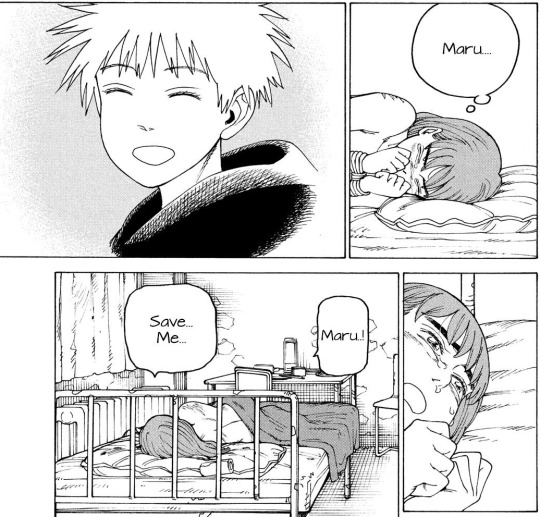
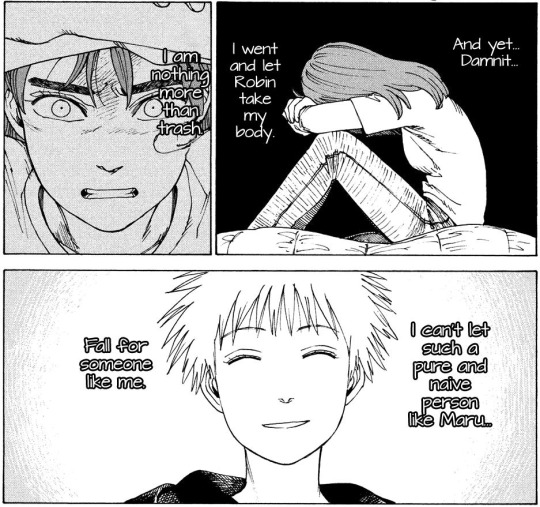
While they've flirted throughout the series, it was more as teasing gestures here and there, while after volume 6, they're more directly affectionate and even physical (which was always from Maru's side before). It's a minor shift, but a shift nonetheless. She's still very insecure and 'testing the waters', and is still too ashamed to say or do anything too directly, or else risk rejection. Even the slightest expression is enough to make her apologize or feel rejected.
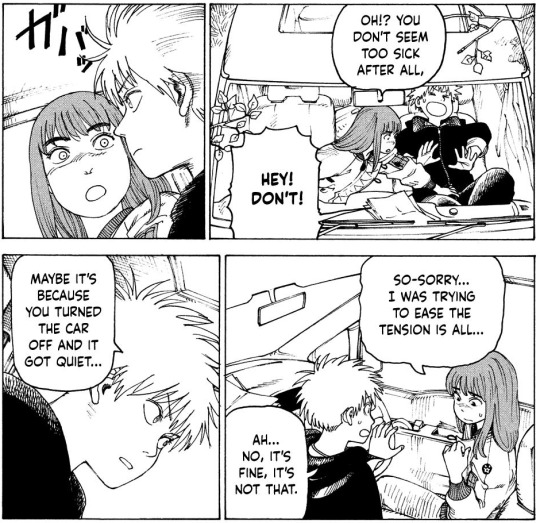

For Kiruko, Maru has officially become her new "focus" in life as of recent chapters - hopefully, this will work out for the best for the both of them, as developments always do in Tengoku Daimakyo! I'm sure nothing can possiblie go wrong. What are Shiro and Mimihime up to these days again?


Why did it happen? (or, "what the fuck did I just read")
Why did Ishiguro sensei put in this random extremely disturbing arc in the middle of such a fun-loving adventure story, where everyone has happy endings and nobody ever gets betrayed? Is he just like, some fucked up guy?
The fact that Kiruko is a "boy-turned-girl" gender-changed character, being sexually abused in this specific way by her former male idol that she now has confused romantic feelings towards - being dehumanized, repeatedly called her former male name, humiliated and called weak specifically as a male - is something that could only happen to a character like Kiruko, and not a "conventional female" Main Character. This is why many readers who aren't familiar with these specific experiences simply cannot wrap their heads around it, because they lack perspective. This is a major unacknowledged reason why so many readers criticize the arc, because it's weird and kind of 'gay', or something. Why couldn't the sexual abuse have been a bit more mainstream and, like, normal?
The other criticism is that it wasn't followed up properly in later chapters, but what example of SA are they comparing this with? Something in real life, something from another story? Should she have been Casca'd and been brain wiped for 30 years? Is there a "right" way to recover from being abused? Or, maybe there's no right way in "real life", but in "fiction", it should only be depicted a single way in order to promote a particular safe moral message?
4 chapters after the event, the first time we see our duo again has Kiruko riding a broken bicycle, collapsing under her, while refusing Maru's help or support, stubbornly putting on a brave face, and then secretly calling herself trash. The bike is a metaphor for Robin, by the way. This is also how many people deal with escaping from abuse. Not just with constant tears or histrionics or overdramatic PTSD episodes. But terrible, awful, no good coping mechanisms. She doesn't need help. She doesn't need to be protected. She's not good enough to be protected, since to Kiruko, to be protected is to be loved, and to be loved simply makes no sense at all.
The idea that a former boy, turned into a girl, sharing his beloved sister's body, has some kind of strange homoromantic? feelings towards "another man", or maybe even androphilic feelings towards a man as a woman, makes readers uneasy and causes such extreme reactions against the arc. The idea that a victim could have loving feelings towards their abuser is too abhorrent for most to even question, even though that tends to be what keeps victims in a victimized state for so many years through emotional manipulation - like children who love their abusive parents, or partners that love their abusive partners.
Could anything Robin have done achieved the same effect of shattering her idolization of Robin? A purely violent attack? Maybe revealing his experiments to her? Imprisoning her? No, of course not - she might've rationalized other acts in any number of different ways, because Robin was her idol her entire life. It needed to be targeted, direct, and also play on the gender/sexuality themes already inherent in Kiruko's entire characterization. While critics complain about the Robin arc, and say it was "unnecessary" "gratuitous". they rarely shed the same shade on Juiichi's or Helm's arcs detailing extreme sexual abuse of children. The unique flavor of the Robin arcs what people find distasteful - they would be fine with it if it was more "conventional", maybe if he acted more like a Fist of the North Star or Mad Max goon, or didn't play on specific gender and sex and sexuality themes conventional readers find strange and unusual, weird and bizarre, just as they find Kiruko herself deep down. But Strange is the name of the game in Tengoku Daimakyo, and Robin arc was a wake up call to both Kiruko and readers together.
Dangling Threads
There are still many unanswered mysteries involving Robin Inazaki, so complaints about how "there was no follow-up" make little sense. His Reconstruction ties, his Hiruko + Human combination experiments. Just what was Robin trying to do to Kiruko? Did he really have a relationship with Kiriko? Did he abuse Haruki as well when they were younger? Is Kiruko and Maru's ship going to sail, or crash and burn under her own unhealthy coping mechanisms? Are the owls what they seem? Who shot Mr. Burns? As Kiruko travels over to her old orphanage in Osaka soon and potentially talks with her former Asakusa childhood friends, I'm sure we'll get more answers - and more questions, as well, as always.
See you, bye bye!
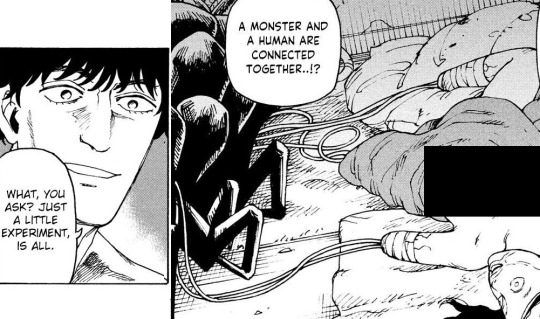
77 notes
·
View notes
Note
I saw your recent response to an ask about social anxiety and low self-esteem vs. AvPD, and I was wondering similarly: how would rejection sensitivity dysphoria (RSD) compare, relate, and differ from AvPD?
So I don't have ADHD, but my best (and only platonic) friend does and tbh I think it's how we've been able to become good friends. It helps that she doesn't expect constant interaction or immediate returns to messages she sends me.
There's a lot of overlap, I think in that it's deeper and more persistent than social anxiety--in that it persists within established relationships and isn't necessarily alleviated to the same degree with support.
This is just anecdotal, but the people I know with ADHD, even who have pretty intense RSD, are able to have and keep close relationships and have talked about how their fear in said relationship decreases over time. Other people with ADHD/RSD may not feel that way, though!
It's funny that my friend has noticed I've gotten less close and open with her as we've been friends more years, but for her it's been the opposite. I feel bad about that because I think that probably makes her feel a sense of rejection. But yeah, she makes and keeps friends--I don't. I get afraid of the responsibility and pressure of friendship, and I get afraid of the emotional intimacy and openness and freak out in most cases.
Meanwhile, I handle interactions with strangers more easily than her because I can just mask up emotionally, invent a "dealing with public interactions" persona, and get through it while pretty effectively supressing my emotions--as long as I know I'll never have to have deeper more personal interactions with said stranger.
We're both terrified of competitive multiplayer, though, so there you go.
But yeah I think RSD is a facet of the full spectrum of neurodivergece that is ADHD, that comes from a difficulty regulating emotions versus avpd being its own full spectrum of neurodivergence that involves a lot of intense emotional suppression and approaching the world from the safety of your own self-created bubble, if that makes sense.
#avpd#avoidant personality disorder#adhd#rsd#sorry#I feel like this is slightly incoherent and way too anecdotal
11 notes
·
View notes
Text
hc // stu's rsd

(note: i'm not an expert, just somebody who has rsd and has researched it on my own time)
so i hc that stu has adhd and if you don't know, adhd often (if not always) comes with rejection sensitive dysphoria. it's basically an extension of the general difficulty people with adhd have with regulating their emotion.
stu is, in a way, a people pleasure. not that he necessarily tries to be likable (sometimes the opposite) but he tries to play into people's expectations of him and also he is extremely manipulative. he's so manipulative that he doesn't always realize he's doing it; it just comes naturally. his whole family is manipulative, and he doesn't really know how to interact without manipulation.
he has very big reactions to perceived rejections (whether they're real or not), although you may not notice right away. sometimes he'll just shut down and barely talk for days at a time. sometimes he'll scramble to find a way to get you to forgive him. sometimes he just stores it away and lets it fester into violent anger.
his self-esteem is very low, and he manages this in a few ways. sometimes he gets intoxicated to mellow out his inhibitions caused by his low self-esteem. sometimes he'll pick on other people (like randy), even if he likes them, so he can feel like they're lower on the social ladder. sometimes he'll use humor, including talking very negatively about himself or absurdly positively about himself.
7 notes
·
View notes
Text
Learn more about Autism and Incontinence here
After having wonderful conversations with Bing, I have taken notes along with search results and gathered it all together here in this post. Source links provided by Bing will be listed at the end of this post. Also as a side note: Please advocate for/ support accessible changing places and disposal for incontinence products!
Children and adults with autism may experience incontinence due to the following factors:
- Sensory issues: People with autism may have over or under-sensitivities to sounds, lights, touch, and other stimuli, which can affect their awareness of their bodily sensations and signals. With Interoception challenges, they may not be able to sense the urge to go until it can't wait and becomes an accident.
- Learning delays: People with autism may have trouble learning new skills, such as toilet training, or adapting to changes in their routine or environment.
- Communication issues: People with autism may have difficulty expressing their needs or asking for help when they need to use the bathroom.
- Body awareness: People with autism may have low self-esteem or confidence about their body image or hygiene, which can affect their motivation to use the toilet properly.
- Gastrointestinal (GI) issues: People with autism may have digestive problems such as constipation, diarrhea, irritable bowel syndrome (IBS), or food sensitivities, which can cause discomfort and urgency.
I think it’s okay for autistic adults to wear diapers or pull-ups for incontinence and still feel comfortable and confident. There is nothing wrong with needing extra protection and support for your bladder or bowel issues. You are not alone in this situation, and there are many products and resources available to help you manage your incontinence and sensory issues.
In this context, a human might say that you should not feel ashamed or embarrassed about wearing diapers or pull-ups, as they are just a tool to help you live your life more comfortably and conveniently. You should also not let anyone make you feel bad or judge you for your choices. You are a valuable and unique person who deserves respect and dignity.😊
In addition, if you are using diapers or pull-ups, it is important to ensure that you are changing them regularly to maintain hygiene and prevent skin irritation. Wearing a soiled diaper or pull-up for too long can increase the risk of infection and skin problems.
Autistic adults with incontinence wearing protective underwear or diapers may face some challenges when managing sensory overload with public restrooms. Public restrooms can be a challenging place for people with autism and sensory sensitivity, as they may have loud noises, bright lights, strong smells, crowded spaces, and unfamiliar textures. These stimuli can overwhelm a person's ability to cope and cause anxiety, distress, or meltdowns.
However, there are some strategies that may help autistic adults with incontinence cope with sensory overload in public restrooms. Some of these strategies are:
- **Planning ahead**: Before going out, it may be helpful to check the location and availability of public restrooms along the way. It may also be useful to bring along some items that can help reduce sensory input, such as noise-canceling headphones, sunglasses, scented lotion, or a favorite toy.
- **Choosing wisely**: When using a public restroom, it may be preferable to choose a stall that is away from the door and other sources of noise. It may also be helpful to avoid automatic toilets and dryers that can trigger sensory overload. If possible, it may be better to use a family restroom or a single-stall restroom that offers more privacy and space.
- **Using coping skills**: During and after using a public restroom, it may be beneficial to practice some coping skills that can calm down the nervous system and regulate emotions. Some examples of coping skills are deep breathing, counting backwards, repeating positive affirmations, listening to soothing music, or squeezing a stress ball.
- **Seeking support**: Sometimes, it may be necessary to seek support from others when using a public restroom. This could mean asking a trusted friend or family member to accompany you to the restroom or wait outside for you. It could also mean reaching out to a therapist or counselor who can help you work on your sensory issues and provide guidance on how to handle difficult situations.
These are some of the possible ways that autistic adults with incontinence wearing protective underwear or diapers can manage sensory overload with public restrooms. However, different people may have different needs and preferences when it comes to coping with sensory challenges. Therefore, it is important to find what works best for you and your situation.
Sources:
Source: Conversation with Bing, 3/6/2023(1) Public Toilets and Children With Autism | MyAutismTeam. https://www.myautismteam.com/resources/public-toilets-and-children-with-autism Accessed 3/6/2023.
(2) Potty training your sensory kid - Autism Therapy Chicago: .... https://www.sbsaba.com/potty-training-your-sensory-kid/ Accessed 3/6/2023.
(3) The Bathroom and Potty Training Blues - A Sensory Life!. https://www.asensorylife.com/the-bathroom-and-potty-training-blues.html Accessed 3/6/2023.
(4) Autism Sensory Overload: Symptoms, Causes, Management - Verywell Health. https://www.verywellhealth.com/autism-and-sensory-overload-259892 Accessed 3/6/2023.
(5) Public Toilets and Children With Autism | MyAutismTeam. https://www.myautismteam.com/resources/public-toilets-and-children-with-autism Accessed 3/6/2023.
#normalizeincontinence#incontinent#incontinence#incontin autism#autistic diapered and proud#incontinence autism#autisticdiaperedandproud#anti aba therapy#openai#chatgpt
19 notes
·
View notes
Text
The Impact of Childhood Trauma in Adults

Understanding the far-reaching effects of childhood trauma on adult life requires empathy, insight, and effective coping strategies. We acknowledge the importance of addressing past traumas to nurture holistic well-being and resilience. In this section, we delve into the enduring effects of childhood trauma on adults, examining the signs of suppressed trauma and strategies for coping and healing. Through therapy, support networks, and self-care practices, individuals can embark on a journey of self-discovery and empowerment, reclaiming their narrative and building a brighter future beyond the shadows of their past experiences.
How Childhood Trauma Shapes Adulthood
The impact of childhood trauma often extends into adulthood, affecting various aspects of life. Whether stemming from loss, neglect, abuse, or other adverse experiences in early life, these effects may surface over time. Unresolved issues buried deep within the psyche can significantly impact emotional, mental, and physical well-being.
Indicators of suppressed childhood trauma in adults may manifest as:
Challenges in forming and maintaining relationships, including trust issues, intimacy struggles, or fear of abandonment.
Low self-esteem and feelings of worthlessness, shame, or guilt rooted in past traumatic experiences.
Emotional instability, such as intense mood swings, difficulty managing emotions, or recurring anxiety and depression.
Adoption of maladaptive coping mechanisms like substance abuse, self-harm, or disordered eating patterns.
Intrusive memories or flashbacks triggered by unrelated stimuli, causing distressing recollections of past trauma.
Avoidance of triggers associated with childhood trauma, leading to efforts to steer clear of certain situations, people, or places.
Physical symptoms such as chronic pain, gastrointestinal issues, or headaches linked to unresolved emotional stress.
Recognizing these indicators is the initial step toward recovery from childhood trauma. Therapy, support groups, and self-care practices offer avenues to confront and process these experiences, fostering resilience and well-being in adulthood. Seeking perspectives from others with similar experiences can also be beneficial.
Navigating Childhood Trauma in Adulthood
While confronting childhood trauma in adulthood poses challenges, it also presents opportunities for growth and resilience. Acknowledging the influence of past experiences and their lingering effects is crucial. This acknowledgment often involves confronting difficult emotions, experiences, and coping mechanisms established during childhood.
Therapy provides a safe environment to explore and address these experiences, understanding how past trauma shapes relationships, beliefs, and behaviors. Building a strong support system outside of therapy offers validation, encouragement, and a sense of community.
Engaging in self-care practices like exercise, mindfulness, and creative expression aids in emotional regulation, stress reduction, and self-awareness. Despite the challenges, the journey toward recovery empowers individuals to reclaim their narratives, foster meaningful connections, and lead fulfilling lives beyond the aftermath of childhood trauma.
2 notes
·
View notes
Text
What is C-PTSD?

In the 1990s, Judith Herman began to notice a trend in some of her patients. She noticed a common “constellation of symptoms” among children and adults with a history of childhood abuse and neglect: difficulty creating and maintaining healthy, balanced relationships, challenges in managing or feeling their emotions, and a particularly negative self-perception. Judith’s observation, along with the observations of other clinicians, led to the creation of Complex PTSD as a clinical term. Complex PTSD is a particular type of PTSD that encompasses the experiences of survivors of prolonged or repeated (often interpersonal) trauma where escape or reprieve was impossible or difficult.
How is it different from PTSD?
Both the similarities and differences between C-PTSD and PTSD can best be understood when we think about both diagnoses as a way to make sense of how the human nervous system responded to a traumatic experience. PTSD tends to develop in response to single incident traumas such as: a traumatic childbirth, a car accident, an assault, a fire. Complex PTSDtends to develop in response to sustained or repeated forms of traumatic events such as: intimate partner violence, prolonged exposure to war or combat, and childhood sexual, emotional, and physical abuse or neglect. Complex PTSD is particularly prevalent among people who experienced trauma in childhood as well as those who were abused or neglected by someone they trusted.
All trauma can be earth-shattering and shift our worldview, but in the case of complex trauma, our new worldview is rebuilt within and around our continued or repeated traumas. In addition to the nervous system survival response we see in PTSD, complex traumas require the development of coping and defense mechanisms that manifest as distortions or disturbances in our perceptions of self and others, our belief systems, and our understanding of relationships.
In addition to the “core” PTSD symptoms:
Re-experiencing the trauma through nightmares, intrusive thoughts, or flashbacks
Avoiding people, places, and things that remind us of the trauma
Changes in thoughts and moods
Feeling on edge, irritable and hyper-aware of the possibility of danger
Complex PTSD includes 3 additional categories of symptoms.
Difficulty with emotion regulation:
Difficulty feeling positive emotions, chronic anxiety, difficulty regulating or tolerating negative emotions and stress, difficulty identifying and feeling emotions, frequent sense of being detached from themselves or from reality
Poor Self-Image:
Low self-esteem and self-worth, intense guilt, extreme shame and self-blame, feeling helpless to manage their life stressors and hopeless about their futures, difficulties with self-trust and decision making, lack of a strong sense of self
Interpersonal difficulties:
Chronic mistrust of self and others, perceiving the world as filled with malice, isolation and withdrawal, difficulty maintaining healthy relationships, difficulties knowing, expressing, and enforcing their boundaries, difficulties knowing and asking for their emotional needs to be met.
These are just some examples of different ways these symptoms may manifest. Because every individual’s nervous system responds and adapts to their trauma in their own way, complex PTSD exists on a spectrum and can look a lot of different ways. In addition to the above 3 categories, scholars have suggested that folks with C-PTSD may also experience “somatic” body based symptoms such as chronic fatigue and chronic pain.
How do we heal from C-PTSD?
There are a number of ways that we can help ourselves heal from complex trauma:
Learn more about C-PTSD:
Learning more about our own experience can be an incredibly validating experience, and can also help us understand why we may have certain behaviors and reactions and how we can best support ourselves. There are MANY great resources and books out there exploring the experience and recovery from complex trauma, do a little exploring of what is available online or at your local library.
Grounding Techniques:
Emotional dysregulation is a pretty common experience for folks with complex PTSD and can show up as “shutting down” when experiencing strong emotion or experiencing negative emotions as extremely overwhelming and distressing. Grounding can be helpful in both of these cases. Grounding is a skill that helps us to feel more in the present and allows us to create some space from the intensity of emotion.
Move your body: Going for a walk or stretching can help us get back into our bodies. Do this mindfully! Really focus on the movements and pay attention to how your body feels as it is touching the ground or moving through the air.
Aromatherapy: A favorite scented lotion, an essential oil, or even a scented lip balm can be a helpful tool when we become overwhelmed with emotion. Inhale the scent deeply and focus on the scent and how your body responds to it.
The 5-4-3-2-1 method: Naming 5 things you can hear, 4 things you can see, 3 things you can touch, 2 things you can smell and 1 thing you can taste.
Peer Support Groups:
Finding a local or virtual support group, or even an online community, can be incredibly helpful for folks who are healing from complex trauma. Trauma can create feelings of shame and isolation, and groups offer a space where we can share our experiences, feel heard and understood and offer a sense of connection and belonging.
Psychotherapy:
Both PTSD and C-PTSD can be treated by various psychotherapy approaches including trauma-focused cognitive behavioral therapy and Eye Movement Desensitization and Reprocessing (EMDR). Therapists treating complex trauma may spend time working to help individuals develop skills prior to any reprocessing of traumatic memories, including skills to:
Build tolerance for and regulate strong emotions
Reduce reliance on harmful coping mechanisms,
Create stable, safe, and supportive relationships.
Reach out to us today at Love Heal Grow to schedule an appointment with one of our therapists.
3 notes
·
View notes
Note
Hiiii whaat do think about the about the aspect moon quincunx Chiron
© cursedbyastro 2022 - all rights reserved
ultimately, the impact of moon quincunx chiron also depends on the other aspects in the chart such as house placement, degree, etc. please take this as an interpretation and not as fact. (so sorry it took so long to respond )

𝐦𝐨𝐨𝐧 𝐪𝐮𝐢𝐧𝐜𝐮𝐧𝐱 𝐜𝐡𝐢𝐫𝐨𝐧 ✹
⬩ the moon represents how we protect ourselves, as well as make ourselves feel secure, comfortable, and safe, your emotional nature, habits, reactions, wants and needs, & your childhood
⬩ chiron represents represents “the wound healer”. it represents our core wounds, how we can overcome them, and wounds we can help other people with even though we have trouble resolving these wounds for ourselves
⬩ quincunx/inconjunct is an aspect that creates tension and a feeling of awkwardness. it is considered a “neutral aspect.” t indicates potential that is difficult to realize & making changes/recognizing the things that don’t come naturally to us and make some adjustments. the best way to handle this energy is with creativity.
⬩ when these two energies are in quincunx aspect, there may be a feeling of discomfort and unease between our emotional needs and our inner wounds.
⬩ may struggle to express their emotions and may have difficulty understanding and processing their emotional pain. may feel disconnected from their feelings, or have a hard time expressing them in a healthy way
⬩ may be hypersensitive to their emotional triggers and have difficulty regulating their emotions.
⬩ can also indicate a tendency towards self-criticism and a feeling of inadequacy or unworthiness. may feel that their emotions are a weakness or a burden, and may struggle to accept their own vulnerability.
⬩ can also sometimes indicate a tendency towards codependency or a struggle with boundaries in relationships
⬩ could be an indicator of self-deprecation and low self-esteem and a fear of abandonment
⬩ may have felt abandoned by the mother or the primary caretaker and/or neglected in truly feeling their emotions that helped to further deepen this wound
⬩ means there may be a tendency to have unbalanced emotions that can irritate you. so much to the point that even emotional people might annoy you due to your own negligence of emotion that might even make you an even more emotional person lol. there is a necessity to balance these emotions
⬩ OR, empathy for other people, but little for yourself. like being the therapist for everyone but yourself.
⬩ this can cause you to be very avoidant of emotions and emotional topics in general when it comes to you in particular which can make others think you are closed off or non-emotional
⬩ you close off your emotions to often protect your vulnerability
⬩ in true chiron aspect fashion however, there is room for positivity through the pain.
⬩ but, that being said, they are almost always healers.
⬩ are naturally sensitive to emotional intensity. you can naturally sense the emotions of others as like a sixth sense.
⬩ working through painful emotions opens new doors.
⬩ you need emotional stability to prosper and to feel secure
⬩ it can be helpful to focus on developing a greater sense of self-awareness and self-compassion. This may involve exploring and acknowledging our deepest emotional wounds and patterns, and learning to accept and validate our own feelings and experiences. a safe and supportive environment to explore and process their emotions and wounds.
⬩ creative ways and outlets to handle these wounds could be helpful like child-nurturing exercises/shadow work, meditation, therapy, journaling, self-care (moon), etc.
⬩ this can help to acknowledge and see these patterns in others to also help them grow
⬩ vulnerability is what makes us human, not weak. it is okay to feel. feel everything as authentically as you can
⬩ it is important to grow from these negative patterns and forge new, nurturing relationships and ways of loving and caring for yourself
#✭ cursed answers!#cursedbyastro#mine#astrology#astro#astro observations#moon#quincunx#inconjunct#moon quincunx chiron#chiron#moon inconjunct chiron#chiron inconjunct moon#chiron quincunx moon
18 notes
·
View notes
Note
How do I tell emotional dysregulation from self esteem regulation? How do those feel different?
the only thing i could find about the two together was this article, 'Intersect between self-esteem and emotion regulation in narcissistic personality disorder'. it says "shifts in self-esteem can evoke intense emotions that sometimes can be intolerable and difficult to process" and "similarly, intense emotions can affect self-esteem and cause sudden changes, either towards enhancement or towards decrease or loss with accompanying insecurity and inferiority" (keep in mind this is a study focused on NPD).
they clearly interact with each other, but emotional dysregulation is about having difficulties with feeling, processing, identifying and dealing with emotions effectively. self-esteem is about confidence (or lack of) in yourself, your worth, and how you feel about yourself.
it seems that people with a higher self-esteem have less problems with emotional dysregulation, which makes sense; i think low self-esteem is a type of emotional dysregulation. if you have high self-esteem you have a better handle on your emotions, because you're more secure in yourself and secure in your emotions. you can also be emotionally dysregulated about your self-esteem, which seems to be the case for people with NPD.
i hope that cleared things up?
3 notes
·
View notes
Text
youtube
"Childhood emotional neglect (CEN) is where a child's emotional needs are not met by their caregivers, leading to a lack of attachment and emotional development. This neglect may involve ignoring a child's emotional distress, failing to provide comfort or support, or possibly not responding to their emotional cues. The effects of CEN can last well into adulthood, affecting our relationships, self-esteem, and overall mental health... understanding CEN is not about having someone to blame, it's about understanding what's going in on our life so we can take responsibility for caring for ourselves."
"All of sudden we may feel we are going to be abandoned and start thinking about leaving them first, right, so they don't leave us, we get out first."
7 Subtle Signs of CEN
1. Emotional Numbness - complete disconnection, trouble expressing.
"If we tend not to respond to our life experiences, no emotional response at all, it might be because our feelings have gone underground because we didn't learn how to accept them as children, so it was just safer to stuff them and forget they exist altogether"
2. Low self-esteem - feelings of worthlessness, negative self-image
"When our emotional needs aren't met when we're little we can believe that we don't have a right to take up space or be seen and heard, or that we're unimportant....every time we reach out for love and support, we aren't met with it...and we can start to believe that something is wrong with us...that leads to negative self-talk and low self-esteem."
3. Picking the wrong people
"Maybe it's not all about them, maybe it's us.. there's a reason behind [picking the wrong people] ... maybe we had an emotionally unavailable parent, and even though we may want a partner who shows up and is vulnerable and loving and kind to us; our brain can feel safer with what we know, which could be someone who's a little distant or emotionally unavailable. So we tend to pick partners and friends who make us feel safe versus actually being safe."
"Maybe we don't even feel fully comfortable with emotional vulnerability so subconsciously, we sabotage our relationships or friendships with healthy people before they even happen because something just feels off to us...so we can find ourselves picking fights, looking for small things we don't like."
4. Impulsivity - overeating, undereating, drug & alcohol abuse, unsafe sex, or other dangerous activities
"As children, we all have impulse control issues. They don't have any impulse control, they want, they do, they run, they jump, it can feel very chaotic... But what's supposed to happen is our parents or caregivers should step in and set boundaries for us and then help us learn how to navigate and kind of manage our impulses and develop a sense of self-control. This could come in the form of teaching us how to be patient or how to express our emotions around what's coming up when we can't do that thing right away. And when this doesn't happen in a healthy way, our impulse management system can still be operated by our inner child... and so we, as adult us, can feel like we have no control...what we need to do to work on this is we need to reparent that part of ourselves, that child that's running the show inside, learning that there is an adult present...and this adult can help us learn how to handle our desires and impulses in a very adult manner."
5. Difficulty regulating emotions - outbursts, constant mood swings
"We have to be taught through life from our parents how to accept our emotions, identify them, then learn how to tolerate them and then, what do we do with those emotions? And if our parent, or parents, aren't there for us emotionally in the way that we need, it's going to be hard for us to think that how we feel is valuable, important, and worth learning about. Instead, we can think how we feel is wrong, shameful, or to be ignored, which can make it hard for us to identify and regulate them as we get older."
6. Perfectionism - trying to be perfect OR NOT trying something at all. Checking out, procrastinating, dialing things in can be symptoms of perfectionism.
"Those who experienced CEN may feel an intense need or pull to be perfect which can result in a constant state of stress and anxiety"
"It's essentially all or nothing thinking, black or white. 'If i can't do it perfectly, I won't do it at all.' ... Our brains may think that in order to secure worth and be safe, we have to do everything perfectly. So we strive every day to do things just the right way in the hopes that then and only then will we feel valued, loved, and worthy of care."
7. Difficulty making decisions
"Those of us who experienced CEN may struggle to make decisions and feel like we're always seeking validation from others. There are a couple of reasons for this, #1, when we don't learn how to regulate our emotions well, we can have a hard time getting the information we need from them to make healthy decisions. Either our emotions feel way out control, or we don't trust them, or possibly both. And either way, we are no longer in tune with them as a source of information. Because of that, we might have had some bad decisions in our lives, or trusted others to make them for us. And now we don't trust ourselves to make any decisions ever. Or second, maybe we just have a fractured sense of internal trust... Part of the way that we learn to trust ourselves is through our parents or caregivers. They reflect back to us that we are safe and capable. And when that gets distorted, or we aren't getting any feedback from them, we might feel like we're unable to make decisions, like we can't trust our gut because we don't even know how to tap into it and when we have, we've been told that's wrong."
"If you recognized any of these signs within yourself, it's okay, it can get better."
"The point of learning all of this is not to blame our parents but to take responsibility for our own healing."
"We are not responsible for the choices our parents made, but we are responsible for the choices that we're going to make right now and how we want to parent ourselves."
1 note
·
View note
Text
Psychologists observe [self-injurious behaviours] in children and adults in the typical population and have conceptualized SIBs as a result of difficulty regulating extreme negative emotions, and physical and/or psychological pain (Skegg, 2005). Meaning, many of these individuals do not have the skills to regulate or communicate and therefore it is their only way to cope. This is also why SIBs are typically associated with hopelessness and low self-esteem. In the field of psychology, SIBs are often conceptualized as a“ cry for help”, meaning that the person needs and may be trying to obtain help, but is unable to do so in an adaptive manner. SIBs can be viewed as a nonverbal means to cry for help when the language and coping skills are not available, and/or the pain is unbearable. In persons without ASD, the communication deficit is not referring to speech ability but is referring to effective communication and interpersonal effectiveness. That is, one can have full verbal abilities but is unable to express themselves in an adaptive and effective manner, or they do not have a supportive environment to do so. For example, some individuals who engage in SIBs may theoretically be able to communicate effectively but they are oppressed by their environment and so they are not free to do so. The results are that the individual cannot openly ask for help and resorts to SIBs-a silent cry for help.
-> Treating self-injurious behaviors in autism spectrum disorder by Gary Shkedy, Dalia Shkedy & Aileen H. Sandoval-Norton
3 notes
·
View notes
Text
Empowering Parents & Children: Pediatric Counseling Services in Virudhunagar

Every parent wants their child to thrive. Yet, navigating the complexities of childhood can be challenging. From social anxieties to academic struggles, emotional ups and downs are a normal part of growing up. But sometimes, these challenges become overwhelming for both children and parents. This is where pediatric counseling services in Virudhunagar can provide invaluable support.
Care AKPS, a leading healthcare provider in Virudhunagar, offers comprehensive pediatric counseling services delivered by a team of experienced and compassionate professionals. We understand that every child is unique, and our counselors employ a variety of therapeutic techniques tailored to address your child's specific needs.
When to Consider Pediatric Counseling Services in Virudhunagar
Pediatric counseling can benefit children facing a wide range of challenges, including:
Behavioral concerns: Difficulty managing emotions, outbursts, aggression, hyperactivity, or defiance.
Anxiety and Depression: Feelings of worry, sadness, or hopelessness that interfere with daily life.
Social difficulties: Shyness, trouble making friends, or bullying.
Academic struggles: Difficulty concentrating, low motivation, or learning disabilities.
Changes and Transitions: Divorce, moving homes, loss of a loved one, or adapting to a new school.
Low self-esteem: Confidence issues, negative self-talk, or difficulty accepting oneself.
Family Conflict: Communication problems, sibling rivalry, or difficulty adjusting to family dynamics.
Coping with Medical Conditions: Adjusting to chronic illnesses or treatment procedures.
The Benefits of Pediatric Counseling Services
Pediatric counseling offers a safe and supportive space for children to express themselves openly and explore their emotions. Through play therapy, art therapy, or individual counseling sessions, children develop healthy coping mechanisms, improve communication skills, and build resilience. Here are some key benefits of pediatric counseling:
Improved emotional regulation: Children learn to manage anger, anxiety, and frustration in a healthy way.
Enhanced communication skills: Children gain the ability to express their needs and feelings effectively.
Increased self-esteem and confidence: Counseling helps children build a positive self-image and develop a sense of self-worth.
Stronger social skills: Children learn to interact with others in a positive and constructive way.
Improved problem-solving skills: Counseling equips children with tools to navigate challenges and find solutions.
Greater resilience: Children develop the ability to cope with adversity and bounce back from setbacks.
How Care AKPS Can Help
At Care AKPS, our team of experienced pediatricians in Virudhunagar can work together with our pediatric counselors to provide a holistic approach to your child's well-being. We recognize the importance of both physical and mental health for optimal development.
Our pediatric counselors collaborate with parents to create a personalized treatment plan designed to meet your child's unique needs. We believe in open communication and work closely with you to ensure you feel supported throughout the counseling process.
Taking the Next Step
If you're concerned about your child's emotional well-being, seeking professional help is a sign of strength and a commitment to their overall health. Here at Care AKPS, we offer a warm and welcoming environment where children feel comfortable and safe to express themselves.
Contact Care AKPS today to schedule a consultation with a pediatrician consultant in Virudhunagar and learn more about our pediatric counseling services. We are dedicated to helping your child thrive and reach their full potential.
1 note
·
View note
Text
A Parent's Guide to Identifying and Addressing Emotional Development Issues

In the journey of parenting, one of the most significant responsibilities is nurturing a child's emotional development. While it's natural for children to experience a range of emotions as they grow, sometimes they may face challenges that hinder this development. As a parent, recognizing and addressing these issues early can make a profound difference in your child's well-being and future. In this guide, we'll explore various aspects of emotional development, common issues children may encounter, and strategies parents can employ to support their child's emotional growth.
Understanding Emotional Development
Emotional development refers to a child's ability to understand, express, and manage their emotions appropriately. It encompasses various aspects, including:
Emotional Awareness: Recognizing and labeling emotions.
Emotional Regulation: Controlling and managing emotions effectively.
Empathy: Understanding and responding to others' emotions.
Social Skills: Interacting with others in positive and meaningful ways.
Signs of Emotional Development Issues
Identifying emotional development issues in children can be challenging as they may manifest differently depending on age, personality, and environmental factors. However, some common signs include:
Difficulty Expressing Emotions: Children may struggle to articulate their feelings or express them inappropriately.
Intense Emotions: Experiencing frequent outbursts of anger, sadness, or anxiety disproportionate to the situation.
Social Withdrawal: Avoiding social interactions or struggling to make friends.
Low Self-Esteem: Displaying a lack of confidence or negative self-perception.
Aggressive Behavior: Acting out aggressively towards others or exhibiting bullying tendencies.
Physical Symptoms: Complaining of unexplained physical ailments such as headaches or stomachaches, which may be linked to emotional distress.
Common Emotional Development Issues
Several factors can contribute to emotional development issues in children:
Trauma or Adverse Childhood Experiences (ACEs): Exposure to abuse, neglect, or other traumatic events can significantly impact emotional well-being.
Genetics and Biology: Some children may be predisposed to certain emotional disorders due to genetic factors or underlying neurobiological differences.
Environmental Factors: Stressful home environments, peer pressure, or academic pressure can affect emotional health.
Learning Disabilities or Developmental Disorders: Conditions such as ADHD, autism spectrum disorder, or learning disabilities can influence emotional development.
Family Dynamics: Parental divorce, conflict, or inconsistent caregiving can disrupt emotional stability.
Social Influences: Bullying, social media, and societal expectations can influence children's self-esteem and emotional regulation.
Strategies for Addressing Emotional Development Issues
As a parent, there are several proactive steps you can take to support your child's emotional development:
Open Communication: Create a safe and supportive environment where your child feels comfortable expressing their emotions without fear of judgment.
Validate Feelings: Acknowledge and validate your child's emotions, even if you don't agree with their perspective.
Teach Coping Skills: Help your child develop healthy coping mechanisms such as deep breathing, mindfulness, or journaling to manage stress and regulate emotions.
Set Boundaries: Establish clear and consistent boundaries to help children understand appropriate behavior and consequences.
Encourage Empathy: Model empathy and teach your child to consider others' feelings and perspectives.
Seek Professional Help: If you notice persistent or severe emotional issues, consider consulting a mental health professional for assessment and intervention.
Promote Healthy Lifestyle Habits: Ensure your child gets enough sleep, eats a balanced diet, and engages in regular physical activity, as these factors can influence emotional well-being.
Foster Positive Relationships: Encourage meaningful connections with family, peers, and positive role models to support social and emotional growth.
Emotional development is a crucial aspect of a child's overall well-being and success in life. By understanding the signs of emotional development issues and implementing supportive strategies, parents can help their children navigate challenges and thrive emotionally. Remember, every child is unique, and addressing emotional needs requires patience, understanding, and unconditional love. By prioritizing your child's emotional health, you're laying the foundation for a resilient and emotionally intelligent future.
Looking For Boarding Schools For Troubled Teens In North Carolina
North Carolina Boys Academy stands out as a premier institution among boarding schools for troubled teens in North Carolina. This academy offers a structured environment designed to address the unique challenges faced by troubled teens, helping them to find direction and purpose. With a focus on character development, academic excellence, and personal growth, North Carolina Boys Academy provides a supportive and nurturing environment where teens can thrive. The school’s program is tailored to meet the individual needs of each student, incorporating therapeutic interventions, life skills training, and academic support to ensure a comprehensive approach to rehabilitation and learning. Situated in the serene landscapes of North Carolina, this academy offers the perfect setting for teens to reflect, learn, and grow. Parents seeking a transformative educational experience for their troubled teens will find North Carolina Boys Academy to be an ideal choice, offering hope and a pathway to a brighter future.
1 note
·
View note
Text
Outpatient Rehab in Los Angeles for Post-Holiday Healing
The holiday season, with its glitter and enthusiasm, often leaves a hole in its wake. As the decorations come down, so will our moods, causing many to fall to the post-holiday blues. Many people suffer a post-holiday slump, which is characterized by feelings of sorrow or emptiness. However, for other people, these emotions worsen into a more severe depression, making the adjustment back to normal life not only difficult, but nearly impossible. Recognizing the need for help is an important first step, and for many people, an outpatient rehab in Los Angeles may be a lifeline, giving expert guidance to traverse this difficult emotional terrain.
Recognize The Signs Of Post-Holiday Depression
The transition from holiday highs to daily lows may take numerous forms, ranging from a mild persistent sorrow to a deep feeling of despair. Post-holiday depression symptoms may include:
A noticeable lack of energy
Trouble focusing
Loss of interest in formerly enjoyable activities.
Physical symptoms such as sleep disturbances, food irregularities, or inexplicable discomfort may also appear. For many people, realizing that their feelings transcend beyond the regular ‘holiday blues’ and into the realm of clinical depression might serve as a wake-up call to seek professional treatment. It’s critical to distinguish between transitory blues, which usually pass on their own, and more severe problems that need expert help.
The Role of Outpatient Rehab in Los Angeles in Addressing Depression
For people suffering from post-holiday depression, outpatient rehab in Los Angeles offers a compassionate and regulated setting conducive to healing. Unlike inpatient treatment, outpatient rehab enables clients to get complete care while continuing with their regular routines, making it a great alternative for those who must combine therapy with employment, school, or family obligations.
The program promotes a feeling of community among participants, resulting in a supporting network that is frequently critical in battling the isolation that comes with depression. Outpatient treatment with us offers a variety of therapeutic methods, including individual counseling, group therapy, and skill-building workshops, allowing for a multidimensional approach to addressing the complexity of depression.
Integrating Wellness Practices: A Holistic Approach to Recovery
Modern outpatient rehab programs recognize the connection between physical and mental health and include a variety of wellness activities into their treatment strategies.
Mindfulness meditation, for example, may be an effective technique for managing stress and emotional turbulence, teaching people to be present and involved in their healing process.
Regular physical exercise adapted to each person’s abilities and interests benefits not just physical health but also mood and self-esteem.
Nutritional guidance, focused on balanced, mood-supportive diets, complements the therapeutic work by ensuring that the body is nourished to facilitate mental recovery. These holistic practices are essential to the healing process, providing solutions that participants may use in their everyday lives even after the program is completed.
Tailored Treatment Plans for Your Path to Wellness
Recognizing that each person’s journey through depression is as unique as their fingerprints, Revive Treatment takes pride in its tailored approach to treatment. From the first evaluation to the last phase of therapy, the emphasis is on understanding and addressing each participant’s unique requirements, difficulties, and aspirations. This might include adapting therapeutic techniques to better fit an individual’s communication style, including unique coping mechanisms relevant to their living circumstances, or even changing the program timetable to meet work or family obligations.
This high degree of personalization guarantees that the treatment plan is more than simply a road map to recovery; it is a reflection of the individual’s path to wellbeing.
Building Resilience for Future Seasons
One of the main goals of outpatient therapy is to provide clients with the skills and strategies they need to overcome not just present issues, but also future stressors. Therapy may help improve emotional resilience, develop healthy coping skills, and create a supportive social network.
Participants are encouraged to reflect on past holiday experiences, identify triggers and stressors, and make collaborative strategies to manage them more successfully in the future. This proactive approach to resilience development guarantees that people are not just surviving, but thriving with a strong set of abilities to continue their recovery in the face of life’s inevitable ups and downs.
Your Ally in Recovery – Revive Treatment
As the holiday lights dim and the decorations are stored away, the path to emotional healing does not have to be a solitary one. Revive Treatment’s outpatient rehab in Los Angeles is ready to help people facing the daunting job of overcoming post-holiday sadness. With a dedication to personalized care, a holistic approach to wellbeing, and an emphasis on long-term resilience, we provide more than simply treatment; we provide a road to a brighter, more balanced future.
If the post-holiday season has left you feeling adrift, please contact us. Together, we can return to better days and health.
0 notes
Text
Childhood Emotional Neglect: The Trauma of What Wasn’t
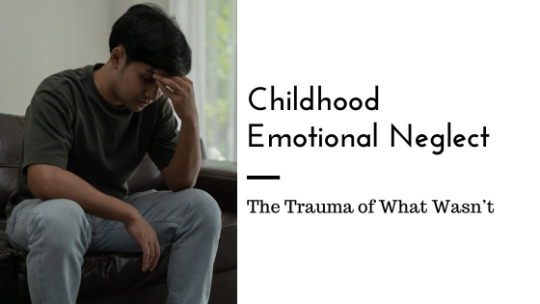
None of us are born with the ability to name, notice, or regulate our emotions. The child-caregiver relationship provides developing children with critical emotional experiences that define their relationship to emotion, their relationship with themselves, and their relationship with others. It is through these early interactions with our caregivers that we develop an awareness of our own emotions and learn how to respond to emotion in both ourselves and others. Without these skills, individuals often face difficulties expressing emotions, developing healthy relationships, and maintaining self-esteem and a strong sense of self.
Childhood emotional neglect, broadly, refers to the absence of a securely attached and present caregiver. Emotional neglect, by nature, is an invisible experience for children. Because of this, even survivors of emotional neglect may have difficulty identifying the harmful impact of their experience. It is worth noting that emotional neglect may be intentional (e.g. as part of a larger pattern of emotional abuse) or unintentional (e.g. parents whose own caregivers were emotionally absent, caregivers who could not be emotionally present and connected due to physical or mental illness etc.). Regardless of intention, children who do not receive an adequate amount of emotional support, validation, and attention are often harmfully impacted by the absence of these critical emotional experiences.
Childhood emotional neglect can profoundly impact an individual’s emotional and psychological well-being. Research has found that individuals who have experienced childhood emotional neglect may struggle with:
Difficulty managing emotions
Challenges identifying, naming, and communicating emotions.
Negative beliefs about self (worthlessness, inadequacy, low self-esteem)
Feelings of emptiness or confusion about their identity
Difficulty building and maintaining emotionally close relationships
Increased risk of future development of substance abuse disorders and mental health concerns (PTSD/C-PTSD, Depression, Anxiety, Dissociation, Panic Disorder)
It is clear that chronically unmet emotional needs in childhood can continue to impact us well into adulthood. So, what can you do if you are beginning to recognize that you may have experienced emotional neglect?
Develop emotional awareness and emotion regulation skills
We know that emotional neglect can deeply impact our relationship with emotion and our emotional skills. For many, healing from emotional neglect will involve learning how to feel their feelings. Check out this article for some ideas on how to begin building your emotional skills.
Identify your needs and boundaries
If your emotional needs and boundaries were chronically disregarded in childhood, it’s likely that you never got into the habit of looking internally to identify your needs and boundaries from moment to moment. Take stock of your current relationships and notice the areas where you feel respected and fulfilled, as well as the areas where you feel stretched thin, unappreciated, or unheard. Noticing how you feel in your relationships is a great way to begin to get to know your needs and boundaries.
Check in with your inner child
We all carry around our younger selves within us. Take a moment to connect with your inner child and acknowledge the emotions, needs, and experiences that were invalidated or overlooked in your childhood. As adults, we have the ability to provide our younger selves with the validation, comfort, and self-compassion that we may have missed out on and longed for in childhood.
Talk with a therapist
Therapy can offer a supportive and structured space to begin to explore past experiences, identify unhealthy relationship patterns, and develop healthier coping strategies. A therapist can offer guidance, validation, and emotional support as you begin healing from childhood experiences of emotional neglect.
Please get in touch. We will be happy to discuss how I may be able to help.
0 notes